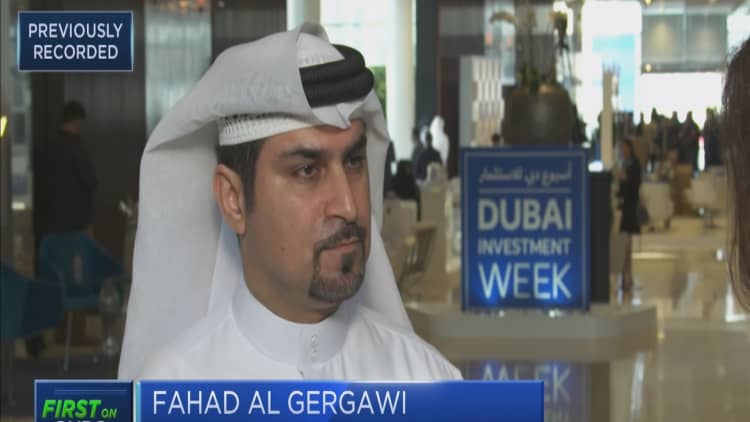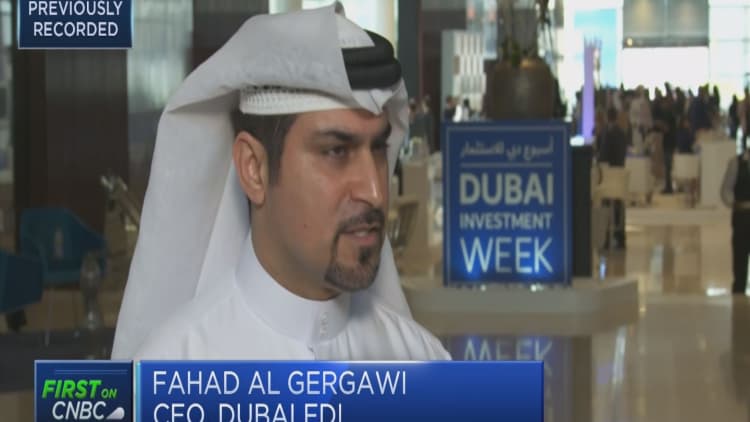
Dubai on Monday launched its first-ever investment week, held under the theme "Investing in Future Transformations" as the emirate celebrated record foreign fund inflows. The event, focused on new technologies and private-public partnerships, is aimed at attracting more private investment to boost growth and job creation amid soft employment figures.
Foreign direct investment (FDI) flows rose to $4.84 billion in first half of 2018 for Dubai, up 26 percent year-on-year. The number of FDI projects surged by 40 percent to 248 in 2018. Dubai raked 10th globally for greenfield FDI, helped by government diversification efforts, relaxed regulations and lowered cost of doing business.
"We're being active globally with different efforts being developing, number one trade and investor relations," Fawaz Al Gergawi, CEO of Dubai FDI, told CNBC's Hadley Gamble at the event. He mentioned the U.S. as their primary source of foreign investment last year, providing 36 percent of the city's total investment.
"We had regular missions to the U.S. to update investors and possible companies of their expansion plans, how they can utilize Dubai to really (reach) the greater market that Dubai serves which is a 2.4 billion consumer market — Indian subcontinent, Middle East, North, East and West Africa."
The emirate of 3.1 million people, the UAE's most populous, has long been a hub for trade and business. Its free trade zones, maritime industry and strategic location at the crossroads of Asia and Africa combined with zero corporate or income taxes and numerous free trade zones have led to a burgeoning expatriate community making up more than 80 percent of the city's population.
Dubai Investment Week seeks to focus on private-public partnerships, innovation and industry 4.0, the current trend of data exchange and automation in manufacturing. Between January 2015 and March of 2018, it attracted $21.6 billion worth of FDI in high-end technology transfers, with the most from the European Union and the U.S. — $5.7 billion and $3.9 billion, respectively.
The figures are in line with the government's plan to turn Dubai into a "smart city" by 2021, implementing data-driven solutions and digitization for improved government services, transportation, and environmental sustainability. The plan, Smart Dubai 2021, is estimated to be worth $7 billion to $8 billion.
"We have the smart city moving very quickly, we're having a policy that is set for blockchain in Dubai to start from 2020, also the 3D printing, green economy, all these things really help companies take a bold decision when they see the government pushing into this," Al Gergawi said.

On the recent economic data front, new business orders in the country slowed to a 20-month low in August. And employment is sluggish, having slowed since 2016, according to Emirates NBD, the UAE's biggest bank. Some companies attributed this to cost saving efforts.
Nonetheless, business confidence in the country's non-oil sector is at a record high, according to the bank. Government spending, investment and exports are expected to be the main drivers of growth.
"The softness in employment, which has been evident to some extent since 2016 but appears to have slowed even further this year, is surprising in the context of strong reported growth in output and new orders in the private sector over the same period," Khatija Haque, head of Middle East and North Africa research at Emirates NBD, told UAE daily newspaper The National in September, commenting on the data.
Asked if it's still safe to invest in the UAE given the geopolitical headwinds brought on by rising regional tensions, Al Gergawi was confident, describing any challenges as merely cyclical.
"I think it's all about economic cycle that private sector doesn't like to recognize, we're having this, it's been almost seven or eight years," the CEO said. "And this is a normal economic cycle and it comes within a time that we saw certain issues within the region. But at the same time we think this is healthy, bringing us as a government and as a private sector to think together how we can develop new strategies to work together and bring the economy back."


